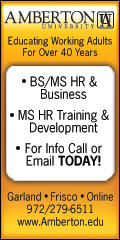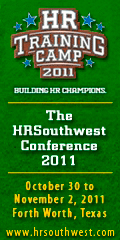HR Matters
Texas SHRM
Don’t forget! Deadline to Register for 2012 Best Companies to Work for in Texas is Friday, July 31.
Please visit www.BestCompaniesTX.com for more information and a registration form. The 2012 Best Companies to Work for in Texas is a survey and analysis program dedicated to identifying and recognizing the best employers in Texas. You can find a description of the assessment and survey process under Assessment Process and answers to most of your questions under the FAQs on the website.
This exciting initiative is brought to you by TEXAS MONTHLY, the Texas Association of Business (TAB), the Texas State Council of the Society for Human Resource Management (TSC-SHRM) and Best Companies Group. The results of the program will be published in a special advertorial section in the February 2012 issue of TEXAS MONTHLY. Winners also will be honored at a luncheon as part of the Texas Association of Business Annual Conference in January.
Best Companies Group manages the process and will be conducting thorough assessments of all the registered companies including a survey of the Texas-based employees. While determining who makes the list is very exciting, the Best Companies Group Employee Feedback Report is where the real value lies. Participating companies will receive the results of the employee survey, identifying the strengths and weaknesses of their workplaces. As an added value, each company will receive employee benchmarking data, which may be used to compare oneself to the list-making companies and the overall participants.
For samples of our surveys and reports, please review the Best Companies to Work for in Texas website or click here: Survey & Reports Samples.
If you have additional questions, please email JackieM@BestCompaniesGroup.com or call 717-909-1570.
Hotel Information and Reservations:
The Westin La Cantera Resort
16641 La Cantera Pkwy.
San Antonio, Texas 78256
210-558-6500 for reservations
TAB Room Rate: Group Code: Texas Association of Business (TAB)
Reservation deadline for discounted rate: Monday, June 13, 2011
$185.00* single/double
TAB/SHRM Texas State Council Employment Relations Symposium, July 13-15 at the Westin La Cantera Resort, San Antonio, Approved for 9.5 HR Certification Institute Credit Hours (2.5 Strategic)
You are encouraged to register to attend the 2011 Texas Employment Relations Symposium on July 13-15, 2011, at the Westin La Cantera Hotel and Resort in San Antonio, Texas. The Texas Association of Business (TAB) and the Society for Human Resource Management (SHRM) Texas State Council have once again formed a partnership to bring you the highest quality human resource training in a resort setting. Attendees of the annual symposium receive cutting-edge labor law changes and trends that are critical to every human resource manager and business owner. Not only will you receive legal counseling from some of the top attorneys in the state, you will get practical guidance from human resource management professionals who apply the rules and regulations to their business environment every day.
Below is just a brief preview of this professional development opportunity:
• The NLRB and What Every Employer Should Know About its New Agenda
• "Want This Job? Password Please"
• "Social Media in the Workplace"
• "I Didn't Know You Couldn't Do That Any More"
• The New Boundaries of Anti-Retaliation
• Keys to Developing a Strategic Generational Diversity Workforce Plan for Your Organization
• Talent Selection & Workforce Management
• Utilizing Highly Effective Job Fit/Job Match Strategies
• Everything's a Disability - The New Regulations under the ADAAA
• FLSA Compliance and Avoiding Class Actions
• Employment Litigation Trends
• ICE Heats up on Employer I-9 Employment Verification Audits - Will Texas Follow?
• How to Handle a Scandal - When Executives Behave Badly
• Developing a Talent Management Strategy for Your Organization
• Workplace Incivility - If It's a Problem, Can a Legal Solution Be Far Behind?
The symposium opens with a welcome reception Wednesday evening, July 13, at 5:30. A Thursday luncheon, as well as continental breakfast and snack breaks on both Thursday and Friday are included with each registration. Go to www.txbiz.org to learn more and register for the TAB/SHRM Employment Relations Symposium. Deadline to reserve rooms at a discounted rate is June 17, 2011.
Appreciation goes to our full conference sponsors: Ogletree Deakins Attorneys at Law, Kemp Smith, Aflac, Meador Staffing Services.
Contact Rachael Small at 512-477-6721, ext. 113, or by email at rsmall@txbiz.org with your questions about this exciting event. See you at the symposium!
Hotel Information and Reservations:
The Westin La Cantera Resort
16641 La Cantera Pkwy.
San Antonio, Texas 78256
210-558-6500 for reservations
TAB Room Rate: Group Code: Texas Association of Business (TAB)
Reservation Deadline: Wednesday, July 13, 2011 - $185.00* single/double; Thursday, July 14, 2011 - $185.00* single/double; Friday, July 15, 2011 - $185.00* single/double. A limited number of rooms are available at the conference price for Friday night.
Myth #1: People with disabilities are not qualified applicants.
Reality: There are many qualified candidates with disabilities. Employers should not assume that persons with disabilities lack the necessary education, training and experience for employment, or that a disabled person would not be able to perform essential job functions. Many times, the only difference is that disabled workers might do things differently. "Differently" could mean more efficiently and better than what others have previously done in the position. Open managers’ minds to the idea that new ideas and methods of performing work can come from workers with disabilities too and that disabled workers may have ideas not provided by non-disabled workers.
Myth #2: Reasonable accommodations are expensive.
Reality: Many employees with disabilities require nothing more than the consideration you may already be providing to your employees, such as flexible work schedules, telecommuting or restructured workstations. Workplace Accommodations: Low Cost, High Impact, research from the Job Accommodation Network (JAN) released in September 2009, found more than half of U.S. employers surveyed had zero accommodation cost; the remaining 34 percent typically spent approximately $600 to accommodate an employee with a disability. JAN even provides free consulting to help employers determine possible accommodations based on disability. HR can help managers understand that accommodations are tools to ensure that a person with a disability can be productive in the same way tools are provided to those without disabilities to ensure their productivity. The tools may be different (i.e., a computer with a larger monitor vs. a computer with a glare screen, or a desktop vs. a laptop to work from home), but they are all just tools to help ensure productivity. Successful organizations invest in all employees and do not limit themselves in finding creative solutions to move the organization forward.
Myth #3: Managers can’t expect the same level of performance from employees with disabilities.
Reality: According to the EEOC, "an employee with a disability must meet the same production standards, whether quantitative or qualitative, as an employee without a disability in the same job. Lowering or changing a production standard because an employee cannot meet it due to a disability is not considered a reasonable accommodation. An employer should evaluate the job performance of an employee with a disability the same way it evaluates any other employee’s performance." When hiring new employees and evaluating current ones, HR can use the EEOC guidance titled Performance Standards to educate managers that expected levels of performance will be the same for employees with disabilities as all others, and stress that loyalty, dependability and a desire to do a good job are not attributes held exclusively by employees without disabilities.
In addition to dispelling myths, HR can help attract candidates with disabilities by: Using disability inclusion statements in job advertisements and the career section of your internet site. Attending disability-focused job fairs. Posting jobs on disability-oriented job boards. Ensuring applications are in formats that are accessible to all persons with disabilities. Providing reasonable accommodations that the qualified applicant will need to compete for the job. Educating all employees, especially managers, about working with employees with disabilities.
Finally, keep in mind that any employee at any moment could develop a disability and require a reasonable accommodation. Many times, these employees face termination of employment, and the business incurs substantial costs to hire and train a new employee, which can far exceed any reasonable accommodation provided to keep the employee employed.
Interested in attending business conferences across the state? Click on the link for details on events that might be of interest: http://www.texasworkforce.org/events.html#tbc
SHRM Foundation Scholarships for SHRM Members Application Deadline: July 15, 2011 The SHRM Foundation awards a total of $100,000 annually in scholarships for SHRM members (http://sapphire.shrm.org/Scholarships/Default.aspx) pursuing degrees in HR-related fields or SPHR, GPHR, PHR or California certification. Members working in the media industry and pursuing a college degree are eligible to apply for a Barbara Sanchez Scholarship. In addition, SHRM professional chapters and state councils are eligible to compete for the certification scholarship to fund programs that promote SPHR, GPHR, PHR or California certification. (Note: 'SHRM members' includes professional, general or associate members. Student members, student chapters and local-only members of chapters are not eligible for this scholarship program.) All applications must be submitted online. The online application process was opened on April 1. You can save your work and then complete the process at a later date. Your application must be completed and submitted by July 15 to be considered for an award.
Appreciative Inquiry is a powerful tool for creating sustainable change in organizations of all sizes. It is a structured process that identifies past successes and provides a method for repeatedly replicating them. By way of background, Appreciative Inquiry is the organizational effectiveness practice originated by David Cooperrider, Ph.D. It challenges the deficit-based approaches most commonly utilized to create change. It is rooted in Social Constructionism, which holds that there is power in positive images. Further, this theory holds that language does not merely describe and define; rather, language is the most powerful tool of creation. The belief is that we create meaning through dialogue and that we use the power of the tongue to create the organization's future.[1]
Heliotropism is the second theoretical component of Appreciative Inquiry. Heliotropism is borrowed from the natural sciences and teaches that all living systems gravitate towards life-giving forces. This is a very condensed, simplified synopsis of these theoretical frameworks.
Moving towards such a nontraditional approach to organizational transformation requires that the practitioner have the appropriate skill set. Whether you are an external consultant looking for new ways to lead your clients to their fullest potential or an internal human resource professional, you will benefit from developing the self before launching an AI intervention. This article details the competencies required to be successful using appreciative approaches to organizational change.
The Practitioner's Skills
Beginning with the skill set, there are three proficiencies that are invaluable in leading the Appreciative Inquiry. The first skill is Courageous Listening. This happens when we listen not just with our auditory functions, but with our whole selves. We bring our hearts to the process, suspend all judgment and are willing to risk being persuaded. We acknowledge the value of other perspectives, even those with which we do not agree. Appreciative Inquiry requires that we teach people to probe and delve into incidents when their best selves, both as individuals and collective groups, were most evident. We are able to lead them on that journey when we are able to listen intently to both what is said and the messages that go unstated. Our capacity to listen is critical. It enables us to connect with the participants more deeply. Further, by listening courageously we model one of the essential skills required to create sustainable transformations.
The second ability is both a skill and an ongoing activity. It is Climate Setting. W. Brendan Reddy describes this as a function of the consultant or facilitator in process consultation.[2] It is the stage when the consultant sets the stage for success by identifying roles and expectations. In an Appreciative Inquiry it is when the model for the intervention is introduced. The organization may opt to use the 4-D model developed by Dr. Cooperrider. It may decide to use the 5 Generic Processes developed by Jane Magruder Watkins and Bernard Mohr. Whichever approach is accepted, it must be welcomed by the group who will be integrating it into almost every aspect of their work. The climate setting skill is in the ability to help people own the process they selected, embrace it and use it consistently in their efforts to create lasting change. It requires that the practitioner be constantly attuned to the climate of the group. Equally as important, the practitioner is required to help the group become able to monitor their own climate. They must be able to create and maintain an environment that will breed collaboration, creativity and communication.
The final skill is Visioning. This is the ability not only to see the preferred future for the organization, but to communicate it clearly to all stakeholders. The practitioner's ability to see and share the vision dreamed by the group is important. It is equally important that the person leading the Appreciative Inquiry not interject their own vision into the process. Instead, they must be able to believe the successes that the organization has enjoyed are replicable. Once the practitioner shares that belief and formulates a positive vision of probable success around that, they are better able to help the group maintain its momentum. As the Appreciative Inquiry progresses and expands throughout the organization, it is increasingly important that everyone involved be able to spread the vision.
Conclusions
Appreciative Inquiry offers a unique method for transforming whole organizations or business units within. It is a different approach in that it is not prescribed or formulaic in any way. Instead it is a process-oriented technique that allows the organization to come into its own based on the shared dreams of the stakeholders. The practitioner who is leading this journey must demonstrate the ability to listen courageously, set and maintain the right climate and envision the very best future for the organization. All of this assumes a high degree of optimism and a commitment to disrupting the status quo with the intent of optimizing the organization.
Joanne L. Smikle provides insightful consulting, speaking and training services to organizations across the country. Her specialties are leadership, team development and customer satisfaction. Reach her at www.smiklespeaks.com or 301.596.3140
[1] Adapted from Appreciative Inquiry: Change at the Speed of Imagination, by Jane Magruder Watkins and Bernard Mohr.
[2] Adapted from Intervention Skills: Process Consultation for Small Groups and Teams, by W. Brendan Reddy.


